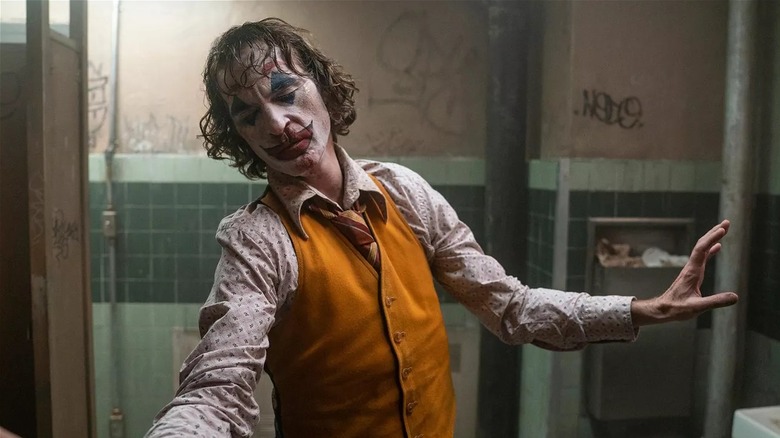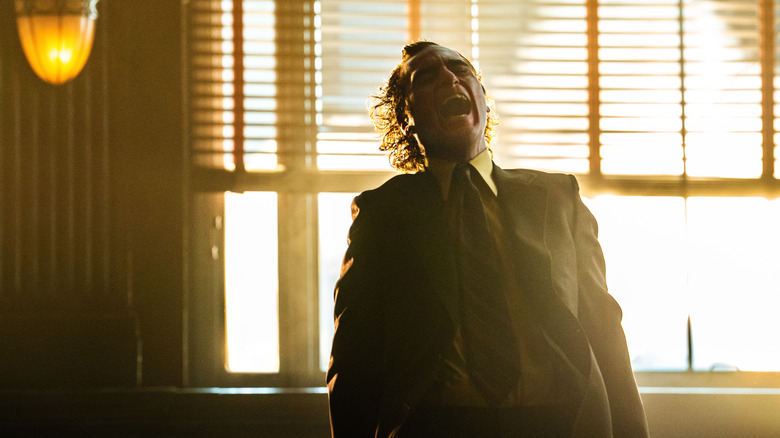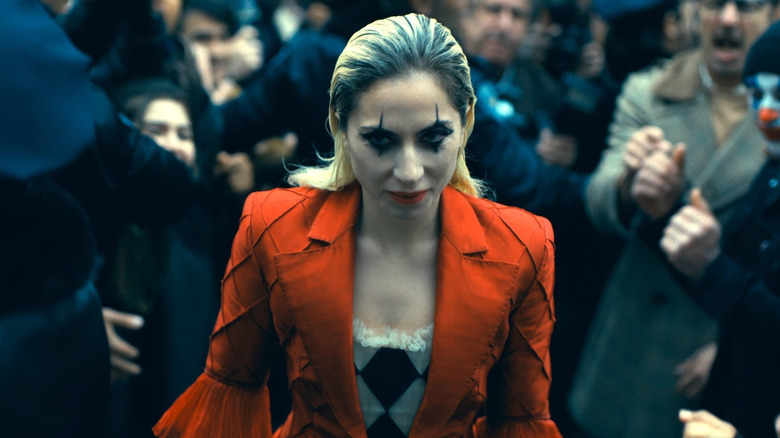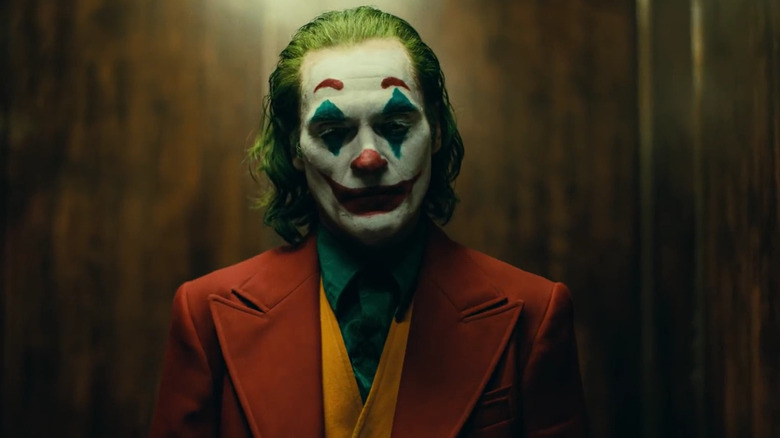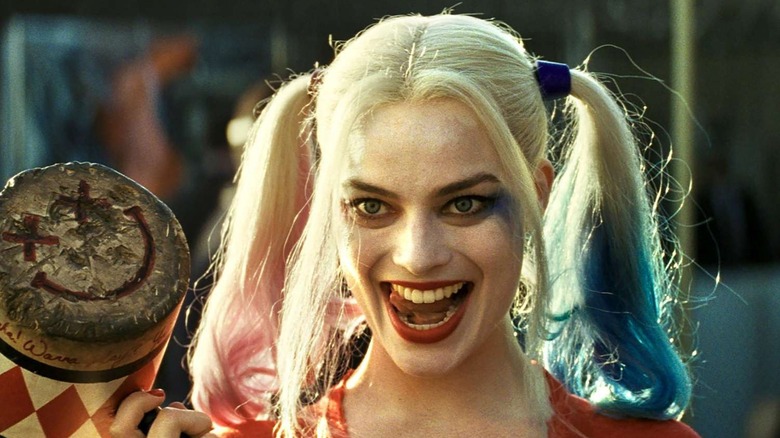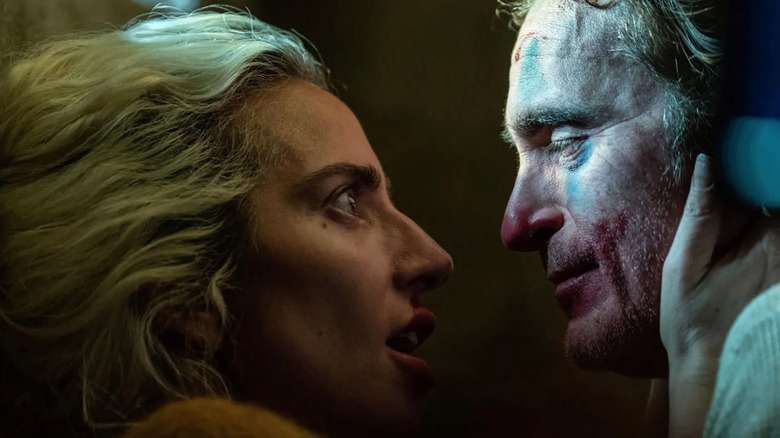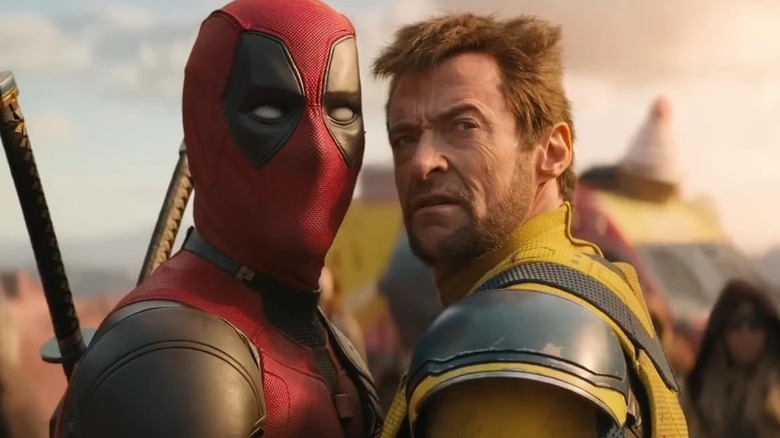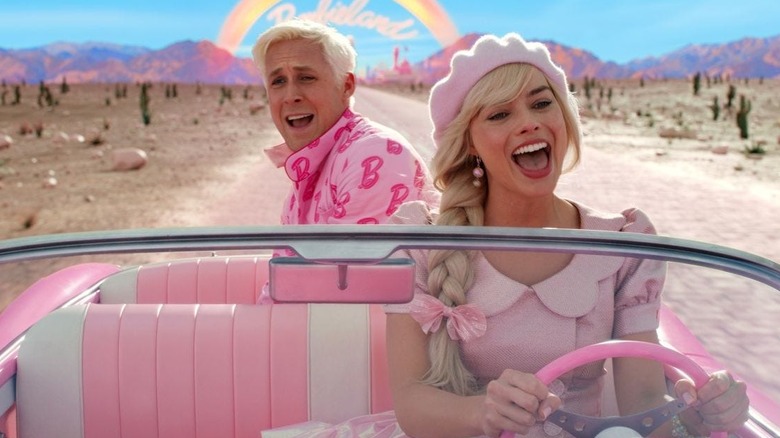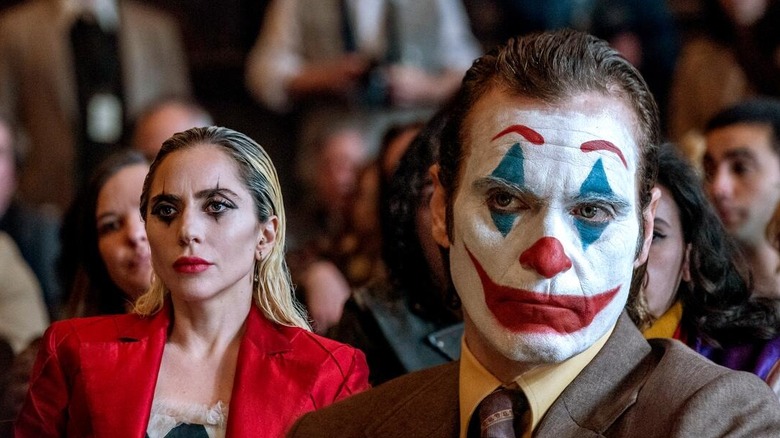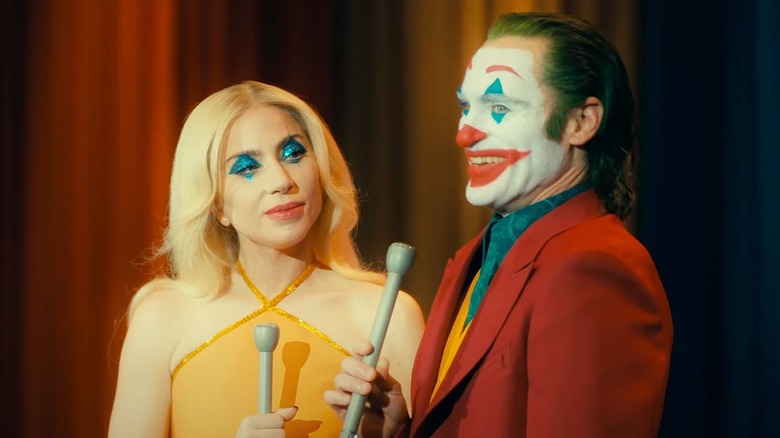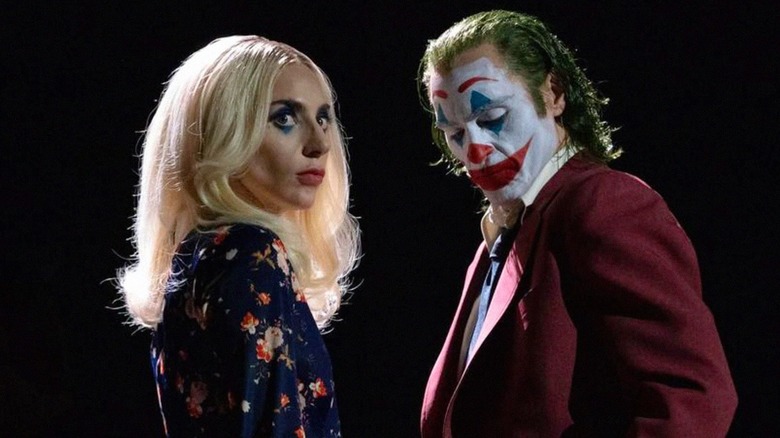Why Joker: Folie à Deux Bombed At The Box Office
"Joker: Folie à Deux" was a full-on dud, opening at the weekend box office with a whimper, not a bang, thanks to an absolutely miniscule $37 million, or less than what multi-billionaire Bruce Wayne carries in his wallet. We're not joking: The 2024 film fell far short of box office forecasts of $50 million to $65 million, and earned less than half of the 2019 original's $96 million.
"Joker" earned more than $1 billion at the global box office, including $335 million in North America, making it the second-highest grossing R-rated movie of all time, a title it held until 2024's "Deadpool and Wolverine." But "Joker" was no run-of-the-mill, milquetoast blockbuster, as it also took home the coveted Golden Lion at the Venice Film Festival, was nominated for 11 Academy Awards, including best picture, and won best actor for its star, Joaquin Phoenix.
A colossal collapse between films begs the question: What the heck happened? While a sequel to a massive success like "Joker" seemed like a no-brainer, it turns out "Joker: Folie à Deux" had financial prospects worse than Gotham's crime rate. For the studio suits at Warner Brothers, this is no laughing matter, because there are many reasons why "Joker: Folie à Deux" bombed at the box office.
Joaquin Phoenix isn't a box office draw
Joaquin Phoenix may be one of the most revered actors of his generation, or any generation for that matter. Phoenix has received four Academy Award nominations, winning one for "Joker." As one critic noted for Movieweb, "Joaquin Phoenix isn't an actor defined by his films, but an actor who defines the films he is in." That was certainly the case for "Joker": while based on one of the most famous villains in pop culture history, it ultimately earned its prestigious reputation for Phoenix's tour-de-force performance.
Yet despite his accolades and accomplishments, one inconvenient fact remains: Joaquin Phoenix isn't much of a box office attraction. Sure, he may be a household name, but those households didn't go to see "Beau Is Afraid" ($11 million worldwide) or "Inherent Vice" ($14 million worldwide). Phoenix's global total is $3.6 billion, which is impressive at face value, until you consider that nearly a third of that comes from one film, "Joker," his biggest hit by half a million.
Before "Joker," his biggest blockbusters came decades ago with "Gladiator" ($451 million) and "Signs" ($408 million), two movies where he played supporting roles behind much bigger stars. Yet even for Phoenix's biggest box office triumph, it wasn't his name above the title that put butts in seats; it was the Joker, one of only a few characters to be an opening weekend box office record holder twice.
Lady Gaga is a music star – not a movie star
Madonna was one of the most famous pop stars of her generation, but star power didn't translate to the silver screen, with her movies earning a per-film average of just $58 million. Why are we talking about Madonna? Because it's starting to appear that the singer many consider Madonna's successor, Lady Gaga, is also a music star, but not a movie star.
Lady Gaga has sold more than 40 million albums worldwide, and became the first female artist to score three singles that each sold 10 million copies worldwide. She's even more impressive on streaming, with more than 31 million followers and over 100 million listeners making her one of Spotify's most-streamed artists of all time.
But do all of Gaga's "Little Monsters" show up to see her movies? Eh, not so much. Let's just say it's more of a "Bad Romance." Lady Gaga's nine films have earned more than $864 million worldwide, for an average of around $108 million per film. That doesn't sound bad, but the reality is shallow: Her only certifiable hit was "A Star Is Born" in 2018 with $432 million. Next is 2021's "House of Gucci" with $147 million, but given that movie had a budget of $75 million, the bougie biopic needed a lot more to make bank. Even if "Joker: Folie à Deux" tops "A Star Is Born" (it won't), its reported $200 million budget will likely make this the biggest bomb of Gaga's career.
The Joker is overexposed
"Joker: Folie à Deux" didn't necessarily need a big star in the title role, because The Clown Prince of Crime is one of the most bankable box office characters in cinema history. "Batman" opened to a then-record $40 million in 1989 on its way to $411 million worldwide, with Jack Nicholson pirouetting in a purple suit and white greasepaint. Nearly 20 years later, "The Dark Knight" broke the opening weekend record with $158 million, ending its run with just over $1 billion worldwide, largely driven by Heath Ledger's Academy Award-winning turn as the "Harlequin of Hate."
Even Jared Leto — considered one of the worst on-screen Jokers — in "Suicide Squad" helped power that 2016 film to $745 million worldwide, despite a less-than-stellar response from fans. Sure, each of those Joker movies featured a key X-factor, Batman, but if you look at The Caped Crusader's biggest hits, they tend to feature the Joker.
But that is part of the problem: The Joker is overexposed. In the 19 years between "Batman" (1989) and "The Dark Knight" (2008), The Joker was only in one movie, 1993's "Batman: Mask of the Phantasm," a spin-off from "Batman: The Animated Series." Since "The Dark Knight," the Joker has been in six: "Suicide Squad," "The Lego Batman Movie," "Birds of Prey," "Joker," Zack Snyder's "Justice League," and "The Batman." That's a lot of Joker. Despite Batman having the best rogues gallery, the Joker is in everything. The failure of "Joker: Folie à Deux" shows that the character is overexposed.
Harley Quinn is not a box office draw
The dark history of Dr. Harleen Quinzel, aka Harley Quinn, began when she was first introduced in "Batman: The Animated Series." Ever since, her popularity with fans has come to rival even the Joker himself — or so it would seem, based on her continued appearances in comic books, cartoons, video games, and Halloween costumes. Alas, as bankable as Harley Quinn is across different media, that has not translated into box office success.
Harley Quinn made her live-action, big screen debut in "Suicide Squad." Spearheaded by the surprisingly pitch-perfect casting of Margot Robbie in the role, "Suicide Squad" defied its absolutely abysmal reviews to open with $133 million. But the 2016 film left a bad taste in fans' mouths, so Harley's next outing, "Birds of Prey," opened to a lackluster $33 million. It ended its run with just $200 million worldwide, less than a third of what its predecessor earned. Yes, "Birds Of Prey" opened in early 2020, but had already tanked before COVID-19 lockdowns closed down theaters, so that was no excuse.
Robbie returned for 2021's "The Suicide Squad," but without Will Smith (or much audience enthusiasm), the pseudo-sequel/reboot bombed with a $26 million opening and $167 million worldwide, a staggering 78% drop from "Suicide Squad." Maybe casting multi-platinum megastar Lady Gaga as a different Harley Quinn would make a difference? Not based on the box office performance of "Joker: Folie à Deux." Sorry to say, but Harley Quinn isn't a big box office draw.
Nobody wanted this movie
Nobody asked for "Joker: Folie à Deux." Sure, just five years earlier, "Joker" gave Warner Brothers executives grins bigger than the Clown Prince of Crime himself. But it turns out the studio paying for the sequel wanted it more than the moviegoers buying tickets for it.
"Joker" was a major risk. It was an R-rated, one-off "Elseworlds" tale that drastically reimagined the Joker and Batman mythos. In fact, we suspect making the movie about the Joker was just a Trojan horse for what it really was: a character study of a lonely and isolated social outcast, on the brink of insanity, who descends into madness and violence. More than a comic book movie, "Joker" was an homage to Martin Scorsese's "Taxi Driver" and "King of Comedy," a fact it didn't even try to disguise with the casting of Robert De Niro in a supporting role. "Joker" could have failed miserably, and the studio knew it, based on its conservative $55 million budget. Instead, the gamble paid off in box office and award season gold.
"Joker" worked because it was fierce, fresh, and original. It felt like a movie that shouldn't exist, like it somehow snuck past the suits. "Joker: Folie à Deux" feels like a cynical and greedy cash grab. Sure, fans will show up to facile franchise films that make no effort to disguise that their objective is to make money. But a wholly unnecessary sequel to "Joker" perhaps felt disingenuous and manipulative in a way moviegoers could sense, which is why they stayed home.
Comic book movie fatigue is still a thing
Before "Joker: Folie à Deux," 2024 featured the return of other fan-favorite comic book characters in a hard R-rated film after a five-plus year hiatus. That film was, of course, "Deadpool and Wolverine," which opened to $211 million, more than "Joker: Folie à Deux" will likely earn in its entire domestic run. The "Deadpool" sequel has earned over $633 million Stateside so far, which will likely eclipse what "Joker: Folie à Deux" will probably make worldwide. And with $1.3 billion and counting worldwide, the Marvel blockbuster will finish as the year's second highest global grosser.
Why did "Deadpool and Wolverine" dominate while "Joker: Folie à Deux" played like a bad joke? Don't let "Deadpool and Wolverine" fool you; comic book media fatigue is still a thing. In fact, it's likely the success of "Deadpool and Wolverine" sucked up a lot of the audience's appetite for comic book movies this year, especially ones you can't technically take your kids too.
Additionally, "Deadpool and Wolverine" brought back two beloved characters in their MCU debut in a way that didn't feel like a cash grab (even if it was). If anything, it felt like an apology to the MCU fanbase for five years of underwhelming films. Meanwhile, "Joker: Folie à Deux" felt like more of the same from Warner Brothers/DC: a contrived and confused continuation of a disconnected franchise that has now had five financial failures in a row. "Joker: Folie à Deux" was supposed to fix that, but instead continued the brand's disastrous trend of turkeys.
Dark movies aren't a box office draw
Have you turned on the news lately? There's not a lot of sunshine and rainbows right now. Sure, "Joker" and "Joker: Folie à Deux" feature a clown dancing to "Smile" and "What The World Needs Now," but the clown is also a homicidal psychopath. These are not happy movies and aren't meant to be. But we are in a very different world in 2024 than we were in 2019 when "Joker" broke records. So it's no wonder that in 2024, "Joker: Folie à Deux" will be lucky to break even.
One look at the top 10 box office charts from the past few years shows the films that moviegoers want to see. "Spider-Man: No Way Home" dominated the 2021 box office with nearly $2 billion by bringing back beloved Spider-Men Tobey McGuire and Andrew Garfield. In 2022, "Avatar: The Way of Water" topped the worldwide charts ($2.3 billion), while "Top Gun: Maverick" won the day domestically ($713 million; $1.4 billion worldwide) by telling stories of teamwork and heroism.
"Barbie" ($1.4 billion) and "The Super Mario Bros. Movie" ($1.3 billion) gave the people what they wanted to see in 2023 with cheerful, colorful comedies featuring world-famous IP. Sure, "Oppenheimer" was a highly successful outlier, but 2024 will likely conclude with fan-friendly "Inside Out 2" and "Deadpool and Wolverine" on top. What won't be anywhere near the top? The dark, dour, and dreadful "Joker: Folie à Deux."
Everybody hated it
"Joker" became a billion-dollar smash because it provided a bridge between two very different moviegoing audiences: comic book movie fans and prestige picture film buffs. In other words, it was a movie that was just as likely to attract your pretentious film professor as your buddies who show up opening night for every Michael Bay movie. "Joker: Folie à Deux" tried to replicate this recipe for success and failed with both audiences.
Sure, comic book movies tend to be critic-proof, as demonstrated by the so-so critical reviews for "Joker." But it was bolstered by strong marks from fans, who loved the film even if the critical establishment did not. "Joker: Folie à Deux" is one of the rare occasions in modern movies where both the critics and fans absolutely loathe the movie. In fact, the fans may hate it even more.
No doubt it's because "Joker: Folie à Deux" is a chaotic, profoundly stupid mess that moviegoers gave a rare Cinemascore of "D," the lowest ever for a comic book movie. A film can do fine in theaters if critics like it and fans don't. A movie can make billions at the box office if fans like it but critics don't. But if critics and fans hate it? You get a cinematic disaster like "Joker: Folie à Deux."
It's a musical
Whose idea was it to follow up an Academy Award-winning character study of a psychopathic serial murderer with a musical? Maybe they figured, "Hey, we got Lady Gaga, might as well use her," but making "Joker: Folie à Deux" a musical has to rank as one of the strangest decisions in modern movies. When the rumors of "Joker: Folie à Deux" being a musical first trickled in, we thought maybe it just featured a few musical numbers, which kind of made sense given it was a journey into the mind of two certifiable lunatics. Now we know for sure that yes, in fact, "Joker: Folie à Deux" is a straight-up musical.
Points for creativity, we guess? The choice is even more bizarre considering that live-action movie musicals have been largely out of fashion for film since before, well, most of us were even born. We can debate the real reason many musicals flop, but we believe it's simply because moviegoers just aren't into them, and haven't been for awhile.
Sure, there are outliers like "Wonka" and "The Greatest Showman," but those movies hid the fact that they were musicals, while the rare hits tend to come from musicals with a built-in audience from Broadway — and even that is no guarantee (see "Cats" ... actually, don't). Making "Joker: Folie à Deux" a musical wasn't a creative swing and a miss, but a critical unforced error that no doubt did tremendous damage to its financial prospects.
It took the audience for granted
Raise your hand if you had to look up "folie à deux?" For reference, the definition according to Merriam-Webster is "the presence of the same or similar delusional ideas in two persons closely associated with one another." In other words, the Joker and Harley Quinn. Sure, we can admire the creativity here, as it is more engaging than "Joker 2" or "Joker: Rise of The Quinn." But let's be honest, there's a reason movie studios usually just put a number at the end of a sequel: it works. Most moviegoers are busy, so it helps to have a title that doesn't confuse people.
Sure, a studio can take a risk by following up "Batman Begins" with "The Dark Knight," because 97.5% of moviegoers know that's Batman. But asking moviegoers to know French and psychological terminology to understand the title for "Joker: Folie à Deux"? That's a stretch.
But the title was just one piece of a larger puzzle. From the movie's name, to its underwhelming, reiterative marketing, to it being a musical (and not being honest about it), to its absolutely outrageous $200 million budget (more than three times the original), everything about "Joker: Folie à Deux" reeked of hubris. This is a movie that took its audience for granted. Alas, the audience just didn't show up, which is why "Joker: Folie à Deux" bombed at the box office.
